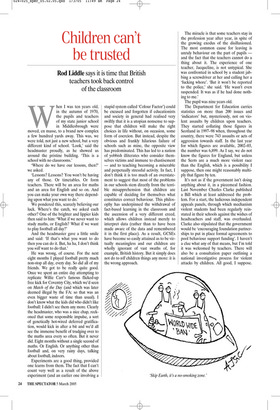Children can’t be trusted
Rod Liddle says it is time that British teachers took back control of the classroom When I was ten years old, in the autumn of 1970, the pupils and teachers of my state junior school in Middlesbrough were moved, en masse, to a brand new complex a few hundred yards away. This was, we were told, not just a new school, but a very different kind of school. ‘Look,’ said the headmaster proudly, as he showed us around the pristine building. ‘This is a school with no classrooms.’ ‘Where do we have our lessons, then?’ we asked.
‘Lessons? Lessons? You won’t be having any of those. Or timetables. Or form teachers. There will be an area for maths and an area for English and so on. And you can make your own way there depending upon what you want to do.’ We pondered this, scarcely believing our luck. Where’s the catch, we asked each other? One of the brighter and lippier kids then said to him: ‘What if we never want to study maths, or English? What if we want to play football all day?’ And the headmaster gave a little smile and said: ‘If that’s what you want to do then you can do it. But, ha ha, I don’t think you will want to do that.’ He was wrong, of course. For the next eight months I played football pretty much non-stop all day, every day. So did all of my friends. We got to be really quite good. Once we spent an entire day attempting to replicate Willie Carr’s famous flicked-up free kick for Coventry City, which we’d seen on Match of the Day (and which was later deemed illegal by the FA: so that was an even bigger waste of time than usual). I don’t know what the kids did who didn’t like football: I didn’t see them any more. Clearly the headmaster, who was a nice chap, reckoned that some responsible impulse, a sort of genetically hot-wired deferred gratification, would kick in after a bit and we’d all see the immense benefit of trudging over to the maths area every so often. But it never did. Eight months without a single second of maths. Or English. Or anything other than football and, on very rainy days, talking about football, indoors.
Experiments are a good thing, provided one learns from them. The fact that I can’t count very well as a result of the above experiment (and an earlier one involving a stupid system called ‘Colour Factor’) could be excused and forgotten if educationists and society in general had realised very swiftly that it is a utopian nonsense to suppose that children will make the right choices in life without, on occasion, some form of coercion. But instead, despite the obvious and frankly hilarious failure of schools such as mine, the opposite view has predominated. This has led to a nation of yobbish illiterates who consider themselves victims and immune to chastisement — and to teaching becoming a miserable and perpetually stressful activity. In fact, I don’t think it is too much of an overstatement to suggest that most of the problems in our schools stem directly from the terrible misapprehension that children are capable of deciding for themselves what constitutes correct behaviour. This philosophy has underpinned the withdrawal of fact-based learning in the classroom and the ascension of a very different creed, which allows children instead merely to interpret data (rather than to have been made aware of the data and remembered it in the first place). As a result, GCSEs have become so easily attained as to be virtually meaningless and our children are wholly ignorant of vast swaths of, for example, British history. But it simply does not do to tell children things any more: it is the wrong approach. The miracle is that some teachers stay in the profession year after year, in spite of the growing exodus of the disillusioned. The most common cause for leaving is unruly behaviour on the part of pupils and the fact that the teachers cannot do a thing about it. The experience of one teacher, Jacqueline, is not untypical. She was confronted in school by a student jabbing a screwdriver at her and calling her a ‘fucking whore’. ‘But it won’t be reported to the police,’ she said. ‘He wasn’t even suspended. It was as if he had done nothing to me.’ The pupil was nine years old.
The Department for Education carries statistics on more than 200 issues and ‘indicators’ but, mysteriously, not on violent assaults by children upon teachers. They started collating those figures in Scotland in 1997–98 when, throughout the country, there were 743 assaults or acts of aggression towards staff. In the last year for which figures are available, 2002–03, the number was 6,899. As I say, we do not know the figures for England, but unless the Scots are a much more violent race than the English, which is a possibility I suppose, then one might reasonably multiply that figure by ten.
It’s not as if the government isn’t doing anything about it, in a piecemeal fashion. Last November Charles Clarke published a Bill which at least addressed the problem. For a start, the ludicrous independent appeals panels, through which mechanism violent students had been regularly reinstated in their schools against the wishes of headteachers and staff, was overhauled. Clarke also stipulated that the government would be ‘encouraging foundation partnerships to put in place formal agreements to pool behaviour support funding’. I haven’t a clue what any of that means, but I’m told it was welcomed by teachers. There will also be a consultation paper outlining a national investigative process for violent attacks by children. All good, I suppose. But it does not get to the heart of the matter, which is a problem of the philosophy embedded not just within the education system, but within society as a whole. The greatest crime is to infringe a child’s rights, regardless of whether the rights of other children, or teachers, are infringed through the failure to impose corrective discipline in the first place. Right now, teachers are powerless. They are prohibited from almost all forms of physical restraint against their aggressive and violent charges. They have been forced to rely upon a lengthy and complex complaints procedure which often achieves nothing. And we wonder why our kids are more aggressive and violent these days. They are more aggressive and violent because they can get away with it. How about an indemnity for teachers who are attacked by pupils, which would allow them to use reasonable force, just short of throttling?
We have a paranoia about children these days, and a strange ambivalence. We mustn’t tell them things or make them do things which they might not wish to do and at the same time we must shield them from exposure to the most minuscule element of risk. Just recently the Education Secretary, Ruth Kelly, addressed the issue of children being killed on out-of-school trips. The teachers’ union, NASUWT, had advised its members not to participate in such extracurricular activities because of the dangers of litigation and/or vilification. And so Ms Kelly has said that if teachers follow the proper guidelines, then they should be OK. She announced that she would ‘develop some guidance which makes it absolutely clear that where a teacher acts reasonably and takes necessary precautions, they really don’t have anything to fear’. If I were a teacher, I’d still be wary, hearing that. In 2003 there were almost ten million ‘pupil visits’ and one death. If we are collectively so traumatised by that one death, there is little that guidelines can do to help. You can’t have guidelines for fate.
In this last week or so we have opened our eyes to another scandal in our schools: apparently children eat pizza and chips for lunch every single day of the week and are becoming, as a result, ever more fat and stupid. You may have watched the excellent Jamie Oliver on television railing against this awful diet. What doesn’t seem to have occurred to anybody is that children will not eat pizza and chips every day if they are not offered pizza and chips every day. And if they are offered pizza and chips every day, they will invariably choose to eat it over more nutritious alternatives. But this hasn’t occurred to anybody, because the whole notion of such a coercive approach is antithetical to our present view of children. Only when we rediscover the importance of instruction will we see an improvement in the classroom and in the dinner queue.



























































 Previous page
Previous page